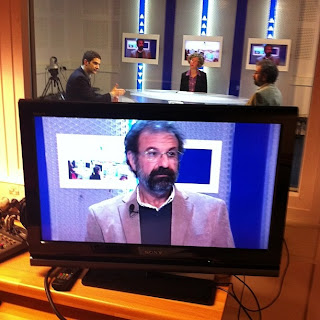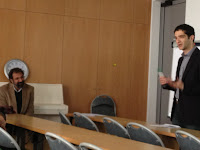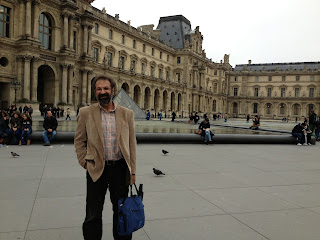While I was in Spain I
received email from German colleagues about an upcoming meeting we were to have
in Amsterdam. My reply: “Wunderbar! Hasta Vreijdag.” Something weird is happening.
May 20, Monday: Five
minutes’ walk from my apartment to Amsterdam Centraal, then by train via
Schiphol, Rotterdam, then Antwerp (with T-mobile texting me messages
whenever I cross a border telling me something I will never understand),
Brussels, then Paris. My first time to France.
 Gorgeous and grand. Rainy
and cold. My invitation was instigated by Brian J.Bowe, a PhD student from
Michigan State on a fellowship at CELSA, the communication school of the
Sorbonne. It was coordinated by Philip Scheiner and another Fulbright Inter-country
lecture arrangement.
Gorgeous and grand. Rainy
and cold. My invitation was instigated by Brian J.Bowe, a PhD student from
Michigan State on a fellowship at CELSA, the communication school of the
Sorbonne. It was coordinated by Philip Scheiner and another Fulbright Inter-country
lecture arrangement.
And incredible luck.
The CELSA acronym
unpacks into English as the Graduate School of Communication of the
Paris-Sorbonne University. I learned that it originated in 1957 as an applied certificate
program for advanced students in communication fields such as public
relations. Journalism came later and even later came media, and research, as it
evolved into a school of its own with numerous departments and coursework in
corporate communication, media production, language instruction, social media,
communication theory, and the analysis of macrosocial processes related to
communication and technology. Brian is on a fellowship here, often acting as a
bridge between the kind of quantitative, English-language social science that
international communication research and Michigan State tend to do, and the
philosophically-oriented, French communication research that thrives here. How
culture is marketed to tourists is one of the topics researchers here explore,
as well as cultures recreate themselves in diasporic communities abroad and
online.
Brian is part of the Languages Department. Its Director is Kyle Schneider,
another member of whom is Felix Zaratiegui, an international advisor and
director of Spanish language programs. But beyond teaching foreign language
these faculty teach foreign culture. This group is like the international
traders or inhabitants of port cities: They are multinational, very multilingual,
and they tend to be exposed to scholarship from international associations and
journals.
I have found each place I have been in Europe, when
two or more Germans are together they speak German. When two or more Dutch are
together they speak Dutch. Two or more Spanish, Spanish. French, French. But
whenever there is any combination at all, English is spoken. At least among the
well educated, English is, ironically, the lingua Franca. This is, of
course, most beneficial to me whenever I am in a multinational conversation,
even though it is sometimes a strain for my colleagues. But it is not a personal
courtesy or even a matter of convenience. It has become a great source of
concern of research scientists throughout Europe to remain involved, integrated,
and recognized in cutting edge research literacy and visibility. This topic was
so salient during my visit because, coincidentally, the government was debating
on whether to authorize more college instruction in English.
So at CELSA, as I have also
heard from German, Dutch, and Spanish colleagues, there is recognition that
English-language journals are the most influential and prestigious. In order to
get and to retain the best students and the best faculty in the world, an
institution’s scholarship must have an international reach and reputation, and
like it or not, that means nowadays that it may need to be done in English. At
CELSA, Brian and Kyle are tentatively working with other researchers to explore
international outlets like the International Communication Association.
What of one’s own language?
What of the culture that is embodied in one’s own language? What of the way of
thinking and the philosophy that pervades speech and writing, which is not in
English? What of its uniqueness? Beyond the question of culture, there are also
strategic issues to confront: Subscription to English-language science has the
potential to place the work of scholars who are not fluent in English and its
style of argumentation at some disadvantage when they must submit manuscripts
to international journals.
The Sorbonne, or at least
this corner of it, faces a dilemma. They have proudly maintained French
research in the French language, with great French success. But they are
wondering whether they are becoming isolated. Is this an inherent problem? Not
necessarily. Does the faculty here need to intersect to a large extent with
non-French scholars? Not absolutely. Does it hamper their ability to attract
the best students in the world and to turn out graduates with an international
reputation? Possibly. That might or might not be a problem. But it’s a topic of
considerable concern, at CELSA, at the Sorbonne, and in France.
I would learn through discussions
with other faculty that CELSA researchers, like those in Barcelona who I met,
employ semiotic analysis. An exciting focus for them has been how, on the one
hand, commercial entities design interfaces and internet platforms that lead
users to do certain things and behave certain ways from which the designers’
institutions might benefit. But, according to Dr. Etienne Candel, users are
aware of the way their online behaviors would be influenced and tracked, and
they alter they behavior to avoid and even subvert this would-be influence and
tracking. How these dynamics are studied seems to assume systematic behavioral
influence attempts by design and in users’ responses, and at the same time some
phenomenological degree of spontaneous rebellion. These are fascinating issues.
I am still struggling to understand how they are emergent and independent and
not causally circular. I said to Etienne, who was describing these processes, I
can’t tell if you are a determinist or an anti-determinist. As I thought he might,
he seemed to cringe at the notion of determinism, but he admitted it was a good
question.

Etienne and I were
interviewed for a video documenting CELSA researchers and visiting scholars,
and we ended up debating vigorously during this taping. It began with when the
moderator, Marie Doezema, an American journalist in Paris and CELSA advisor,
asked me to say what I study and what brought me to the subject. I explained
that I’m primarily concerned with how people get to know each other and relate
to each other online, and that these questions have evolved into a series of
studies looking at Web 2.0 systems and how we relate to the various sources in
these interface systems. Etienne argued one cannot really get to know someone
via the Internet the way you would in person: The anonymity and the frequent
deception that takes place when one interacts with someone on the other side of
the globe, for instance, raises questions about how one can truly get to know
another person online. And since people lie online, the authenticity of these
relationships are questionable when they are bound to the Internet.
I said I
agreed with everything he said, except for the qualifier, “when they are bound
to the Internet.” How truly do we ever know another person, I asked, even
face-to-face? And as far as anonymity goes, should I get email from Etienne
when I am in Michigan and he is in Paris, does it make sense to say that there
is any anonymity of the Internet at all? Or in any context when the source has a
name, as there is a greater tendency to require in online discussions these
days? And as far as deception goes, lying has been happening long before the
Internet, and I don’t believe there’s any real evidence that it is more common
online than offline, I added. So, I said, I think Etienne has described the
human condition, not the Internet. He countered that there is a common narrative
about deception via digital communication. It is the Internet’s reputation, and
the belief that the Internet prompts deceptive communication is so widespread
that it affects people’s actions whether the rumor is true or not. I said I
agreed and I disagreed: I concur that there’s a widespread assumption that many
people present themselves falsely online, but I disagree about its actual
prevalence and or even that the belief pervades much online behavior. For one
thing, selective self-presentation need not be dishonest; it is partial. It is
easier to present one’ desired characteristics online, but that does not mean
that we do not possess those characteristics nor that we do not try to do the
same offline. But in terms of the narrative affecting interaction, that’s an
intriguing notion but is it real, all the time? In America we have a stereotype
about car salesmen being dishonest. But I think that when we go to buy a car we
mostly put our suspicion aside once we see that the salesman is really just a
person trying to do a job that you asked him to do. I think people go into the
situation with suspicion but they put it aside rather readily, most of the
time. I think it is the same with digital media. I contact someone and we share
information and I learn about the person enough to get things done. If I email
Etienne and he writes back, I don’t proceed as if he is lying to me. And if in
the course of our exchanges we find out that we both like jazz music, that’s
great and not something we get suspicious about. We learn about each other
enough for our relationship to serve its purpose. It was a good debate. I have
reported my comments at greater length than I reported his, although his may
have taken a greater proportion of the discussion. It will be on YouTube
someday, I’m told.

The discussion continued, in
a way, after my research presentation. My talk presented numerous experiments,
and conclusions deduced from theories and supported with statistical tests.
This approach is uncommon at CELSA where they focus on cultural critique and
the interpretation of users’ actions. It is qualitative rather than
quantitative and it focuses on case studies as examples of broader social and
institutional intrusions into users’ prospective behavior, their privacy, and
economics. My kind of work is often criticized as too sterile, artificial, and
ungenuine to be informative. Frankly, people who approach work their way and my
way often get along quite poorly, and end up rather polarized with respect to
what counts as valuable research. Things were only slightly combative during
the period for discussion following my presentation. They challenged me.

Dr. Valérie Jeanne-Perrier
asked me, “In these experiments of yours how much do you take context into
account? How much do you study context?” she queried. “Not nearly as much as
you would like me to!” was my response. I explained that we know the context of
a lab experiment is often artificial, and that is an accepted limitation, yet
we try to design experiments that are generic and abstract so that they may be
applicable to a broad array of contexts. This is just as much a limitation as
it is to study one context in detail and not know how generalized one context
is to another. Dr. Karine
Berthelot-Guiet, CELSA’s Research Director, disagreed: We find the same thing in many contexts, she said. I asked
her to expound using the example of how users try to subvert the would-be
intrusions of privacy by platform designs—do users who are aware the potential
dangers always work around them?
“Yes,” she said.
“They always do so,” I
asked, “but in different ways depending on the nature of the systems and their
knowledge of how to defeat them?”
“Yes,” she said, in each
context, no matter how the platforms are designed to exploit the users, the
users find ways to undermine them.
“Then we are in complete
agreement!” I said. “There is a determinist law of behavior that users who
suspect interface designs of potential exploitation find ways to undermine
them, and what contextual analysis does is confirm the patterns and illustrate
the specific illustration. We are walking down two sides of the same street!”
There seemed to be a sense
of surprised agreement, although it also seemed that it might take a while
before people would decide if they were comfortable with it or not.
 |
| Behind the Louvre, with the stylish ICA man-purse |
A stimulating day and a most
enjoyable visit. I will never forget the intellectual challenge and, I think,
mutual respect that may not have been expected but seemed to emerge, gladly,
nevertheless.
A little more walking in
Paris and back by train “home” to Amsterdam.